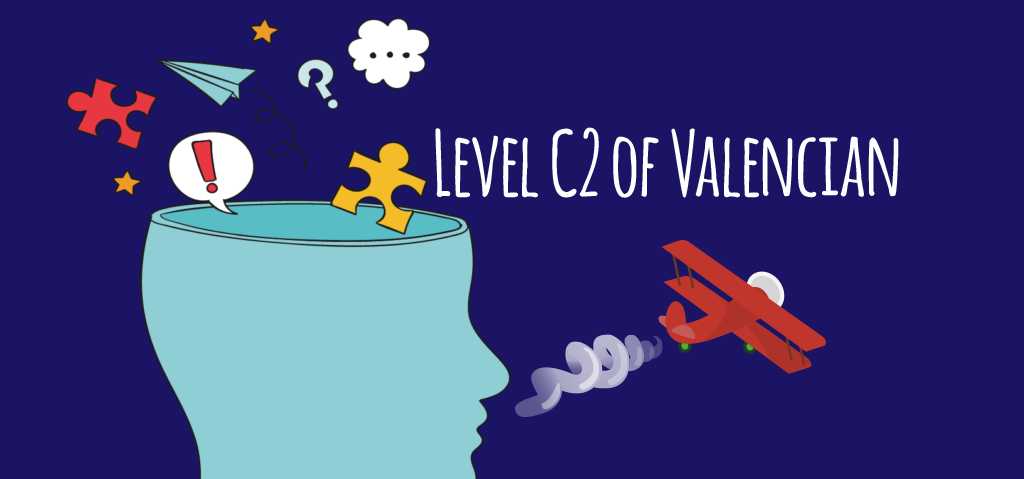Level C2 of Valencian

The C2 level certificate accredits a command of the use of the language, both oral and written, of an advanced experienced user , which allows expressing oneself with spontaneity, flexibility, complexity, fluency and correctness, and producing a speech, oral or written, appropriate to the recipient , to the communicative purpose and the registration required by the situation.
Structure
| Area | Value | Duration |
| Written comprehension | 10% | 1 hour |
| Linguistic structures | 20 % | and 30 minutes |
| Oral expression and interaction | 25% | ± 25 minutes |
| Written expression area | Four. Five % | 2 hours and 30 minutes |
Written comprehension
Can understand and interpret any form of written language , including highly demanding academic and cognitive materials, literary or non-literary, abstract and structurally complex texts or rich in colloquial expressions, appreciating subtle distinctions of style.
- It understands a wide range of texts that can appear in social, professional or academic life, and identifies subtle details that include attitudes and opinions of the author, both implicit and explicit.
- Understand without problems a wide range of literary texts. (Poems, stories, contemporary short narrative, novels, theater …) or that refer to real events, and appreciate the differences in style.
- Understand colloquial or idiomatic expressions, even those of less general use.
- You can anticipate what you read.
- Capture the presuppositions, the understood ones and what is not said explicitly (ambiguities, double meanings, ellipsis, traits of the author of the text, etc.), and the tone of the text (irony, sarcasm, humor, etc.).
Linguistic structures
He has an exhaustive, correct and highly reliable command of linguistic structures, without manifesting any type of limitation to formulate, with a precise and rich lexicon, his thought, eliminating ambiguity and adjusting expressive resources to the degree of formality and the specific requirements of a very extensive series of discursive genres.
- Correct and adequate speech to the different registers. He dominates the vowel and consonant systems, both in the field of phonic identification and in that of production.
- Mastery of the spelling regulations , including the exceptions and the most difficult cases, and write texts without spelling mistakes. Know the criteria used when making phonetic and graphic adaptations of foreign words (loanwords).
- Able to use without restrictions , and with almost absolute precision, the various forms of all grammatical categories; masters a wide range of textual and sentence syntax resources, including the most normatively problematic uses, and can use this knowledge depending on the communication context, gender, and degree of formality of the situation.
- He is proficient in a very broad lexical repertoire that includes idiomatic and colloquial expressions, and demonstrates being aware of the degrees of semantic connotation, as well as of the adequacy to the formality of the speech and of the intended uses of change of register.
- He expresses himself with absolute lexical precision and consistently uses correct and appropriate vocabulary. It has a broad semantic competence not only related to the lexicon, but also that transmitted by the grammatical elements and the pragmatic perspective
Written expression and interaction
You can write complex texts clearly and fluently , with an appropriate and effective style and a logical structure that helps the recipient to find the important points. You can interact in writing with ease and skill, and you can grasp the implicit nuances of the speaker and make allusions.
- Able to write well-constructed, interesting and easily readable stories and descriptions of lived experiences, in a genre-appropriate style.
- Write reports or complex articles , criticisms (literary or audiovisual products) and research projects that present arguments, with a logical, efficient and fluid structure.
- He is capable of writing texts of high formality in a standard variety , of a specialized and non-specialized nature, which require considerable prior preparation: texts from the journalistic field (letters to the editor of a newspaper, opinion articles, contributions in magazines …); formal correspondence to institutions, companies …; written texts to be delivered (short speeches, speeches at parties, meetings …), etc.
- Accurately summarize long and demanding narrative literary, expository, argumentative texts , etc.
- Produce a clear, fluid and well structured speech that demonstrates a totally controlled use of organizational structures and cohesion mechanisms typical of the formal written language.
Oral expression and interaction
Express himself spontaneously, with fluency and precision , with his own elocution of the most formal registers and differentiate small nuances of meaning, even in the most complex situations, and knows how to adapt his speech to that of the interlocutors.
- Present complex topics confidently to an unfamiliar audience , structure and adapt the presentation flexibly to respond to the needs of this audience, and highlight significant points.
- Interact in a comfortable and appropriate way without linguistic limitation in any situation of personal and social life.
- Contribute to conversational, formal and non-formal texts , structuring the discourse and interacting with authority and complete fluency, as a Valencian speaker would.
- Make clear , elaborate and well-constructed expositions and arguments , in a simple and fluid way. You can defend your position in formal discussions on complex issues, with articulate and persuasive arguments.
- He has a correct elocution, which is capable of adapting to different registers and communicative situations.
For registration contact us:
https://examenexam.com/es/es/


